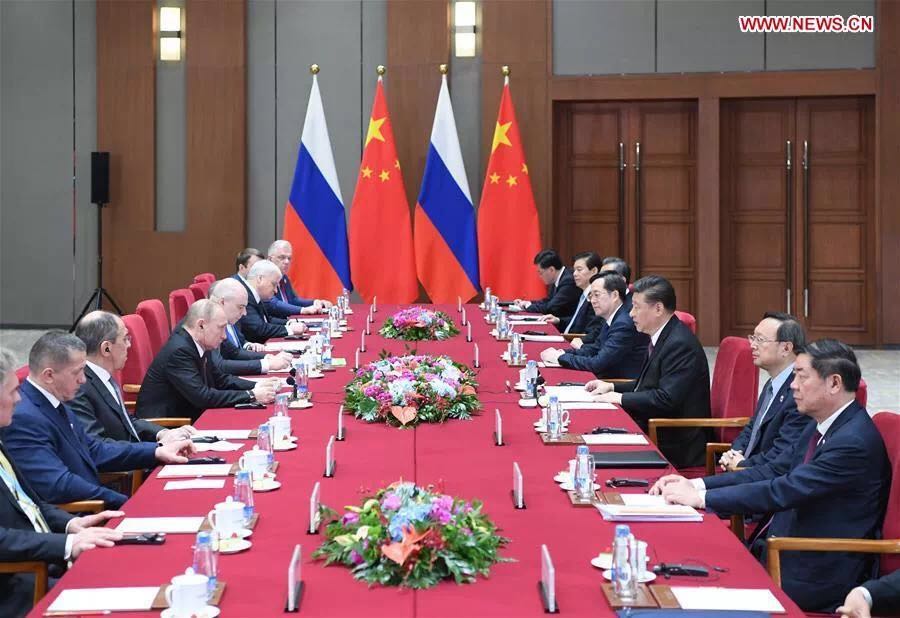As the annual St. Petersburg International Economic Forum (SPIEF) is to be held from June 6 to 8, it's meaningful to recall the flowering economic ties between China and Russia. Against the backdrop of rising anti-globalization sentiments, the surging bilateral trade volume between the two countries did not come easily. What are the reasons for the prosperous Sino-Russian economic ties?
First of all, both Chinese and Russian governments have been offering institutional support for the two countries' pragmatic cooperation. Officials at different levels exchanged visits frequently. It is worth noting that Chinese President Xi Jinping and his Russian counterpart Vladimir Putin met four times last year.
Increased governmental exchanges have paved the way for the two countries' economic cooperation. Sino-Russian bilateral trade volume increased from 84 billion U.S. dollars in 2017 to 107.06 billion U.S. dollars in 2018, up 27.1 percent year-on-year. Moreover, 11 of the China-invested projects in Russia were put into operation last year, for instance, the Mohe-Daqing section of the China-Russia crude oil pipeline.
Secondly, the Sino-Russian trade structure has been continuously improved. Previously, Beijing-Moscow cooperation was mainly focused on energy and resources. But in recent years, the two countries found more economic complementarities in other fields including agriculture, seafood and so forth.

A cross-border bridge connecting Russia's Blagoveshchensk and China's Heihe is under construction in Blagoveshchensk, Russia, May 31, 2019. /VCG Photo
In the first 11 months of 2018, China-Russia trade in mechanical and electrical products, high-tech products and agricultural produce rose by 15 percent, 29 percent and 31 percent, respectively, according to Xinhua reports.
Moreover, cross-border e-commerce has become another highlight of Sino-Russian trade, with Alibaba Group setting up AliExpress Russia, a one-stop shop for Russian customers. The improvements in the trade structure will help reduce the impact of fluctuating resource prices in the international market on Sino-Russian bilateral trade in the long run.
Thirdly, external pressure has pushed China and Russia closer in economy. On the one hand, Russia, in the wake of Western sanctions, is looking east and needs China for trade and economic growth.
On the other hand, close economic ties with Russia are also beneficial to China, especially at the time when the United States launched a unilateral trade fight against China. Intense trade ties between the two countries are not only financially beneficial but more importantly, conducive to ensuring their economic security.
To ensure steady trade growth, China and Russia need to make more efforts in the following aspects. Firstly, to further improve the business environment and promote trade facilitation. The two governments need to further relax the investment restrictions and facilitate the direct exchange of their currencies so as to make trade easier and safer.

Chinese President Xi Jinping (right) holds talks with his Russian counterpart Vladimir Putin on the sidelines of the Second Belt and Road Forum for International Cooperation in Beijing, China, April 26, 2019. /Xinhua Photo
Secondly, to encourage exchanges and cooperation at the sub-government levels. At present, China-Russia economic projects are mainly conducted by large-scaled state-owned enterprises. Local governments need to encourage enterprises of all sizes to play a part in the market.
This will help enhance mutual understanding between people from the two countries, which, in turn, will further strengthen the mutual trust between the two governments.
Thirdly, to deepen the cooperation between the Belt and Road Initiative (BRI) and the Eurasian Economic Union (EAEU). As major powers in the world, both China and Russia should play a greater role in advocating a fair and reasonable multilateral trading system.
With the integration of the BRI and EAEU, the two countries can provide more public goods, facilitate regional investment environment and promote trade liberalization. This is not only conducive to the balanced development of the region but, more importantly, is a strong counterattack against the rising populism and anti-globalization practices in some certain countries.
Sino-Russian trade volume is expected to continue to grow in the future. The two sides should put more efforts in promoting mutually beneficial cooperation and establishing a high-level free trade zone, thus injecting lasting momentum into the economic development of the two countries and the world.
Xu Qinhua is vice dean of the National Academy of Development and Strategy at Renmin University of China. Wang Bing is a lecturer at the University of Science and Technology Beijing.






